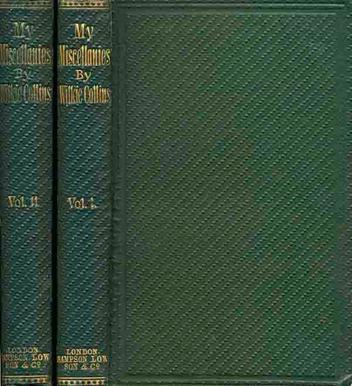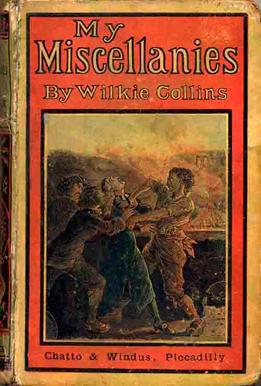Complete Works of Wilkie Collins (1612 page)
Read Complete Works of Wilkie Collins Online
Authors: Wilkie Collins


This collection of twenty-four essays and stories was dedicated to Henry Bullar.
Consisting of light-hearted pieces, serious social comment and historical narratives, all the stories had previously been published in
Household Works
or
All The Year Round.

The first edition

A later edition
MY MISCELLANIES
Affectionately Inscribed
TO
HENRY BULLAR,
(of the western circuit).
CONTENTS
THE GREAT (FORGOTTEN) INVASION.
A JOURNEY IN SEARCH OF NOTHING.
PORTRAIT OF AN AUTHOR, PAINTED BY HIS PUBLISHER.
A PETITION TO THE NOVEL-WRITERS.
THE various papers of which the following collection is composed were most of them written some years since, and were all originally published — with many more, which I have not thought it desirable to reprint — in
Household Words
and in the earlier volumes of
All the Year Round.
They were fortunate enough to be received with favor by the reader, at the period of their first appearance, and were thought worthy in many instances of being largely quoted from in other journals. After careful selection and revision, they are now collected in book form; having been so arranged, in contrast with each other, as to present specimens of all the shorter compositions which I have contributed in past years to periodical literature.
My object in writing most of these papers — especially those collected under the general heads of “Sketches of Character” and “Social Grievances” — was to present what I had observed and what I had thought, in the lightest and the least pretentious form; to address the public (if I could) with something of the ease of letter-writing, and something of the familiarity of friendly talk. The literary Pulpit appeared to me at that time — as it appears to me still — to be rather overcrowded with the Preachers of Lay Sermons. Views of life and society to set us thinking penitently in somejcases, or doubting contemptuously in others, were, I thought, quite plentiful enough already. More freshness and novelty of appeal to the much-lectured and much-enduring reader seemed to lie in views which might put us on easier terms with ourselves and with others; and which might encourage us to laugh good-humoredly over some of the lighter eccentricities of character, and some of the more palpable absurdities of custom — without any unfair perversion of truth, or any needless descent to the lower regions of vulgarity and caricature. With that idea, all the lighter contributions to these Miscellanies were originally written; and with that idea they are now again dismissed from my desk, to win what approval they may from new readers.
HARLEY-STREET, LONDON.
SKETCHES OF CHARACTER. — IV.
THE great merit of this subject is that it starts itself.
The Bachelor Bedroom is familiar to everybody who owns a country house, and to everybody who has stayed in a country house. It is the one especial sleeping apartment, in all civilized residences used for the reception of company which preserves a character of its own. Married people and young ladies may be shifted about from bedroom to bedroom as their own caprice or the domestic convenience of the host may suggest. But the bachelor guest, when he has once had his room set apart for him, contrives to dedicate it to the perpetual occupation of single men from that moment. Who else is to have the room afterward, when the very atmosphere of it is altered by tobacco-smoke? Who can venture to throw it open to nervous spinsters, or respectable married couples, when the footman is certain, from mere force of habit, to make his appearance at the door with contraband bottles and glasses, after the rest of the family have retired for the night? Where, even if these difficulties could be got over, is any second sleeping apartment to be found, in any house of ordinary construction, isolated enough to secure the soberly reposing portion of the guests from being disturbed by the regular midnight party which the bachelor persists in giving in his bedroom? Dining-rooms and breakfast-rooms may change places; double-bedded rooms and single-bedded rooms may shift their respective characters backward and forward amicably among each other — but the Bachelor Bedroom remains immovably in its own place; sticks immutably to its own bad character; stands out victoriously whether the house is full or whether the house is empty, the one hospitable institution that no repentant after-thoughts of host or hostess can ever hope to suppress.
Such a social phenomenon as this, taken with its surrounding circumstances, deserves more notice than it has yet obtained. The bachelor has been profusely served up on all sorts of literary tables; but the presentation of him has been hitherto remarkable for a singularly monotonous flavour of matrimonial sauce. We have heard of his loneliness, and its remedy; of his solitary position in illness, and its remedy; of the miserable neglect of his linen, and its remedy. But what have we heard of him in connection with his remarkable bedroom at those periods of his existence when he, like the rest of the world, is a visitor at his friend’s country house? Who has presented him, in his relation to married society, under those peculiar circumstances of his life, when he is away from his solitary chambers, and is thrown straight into the sacred centre of that home circle from which his ordinary habits are so universally supposed to exclude him? Here, surely, is a new aspect of the bachelor still left to be presented; and here is a new subject for worn-out readers of the nineteenth century, whose fountain of literary novelty has become exhausted at the source.
Let me sketch the history — in anticipation of a large and serious work which I intend to produce, one of these days, on the same subject — of the Bachelor Bedroom, in a certain comfortable country house, whose hospitable doors fly open to me with the beginning of summer, and close no more until the autumn is ended. I must beg permission to treat this interesting topic from the purely human point of view. In other words, I propose describing, not the Bedroom itself, but the succession of remarkable bachelors who have passed through it in my time.